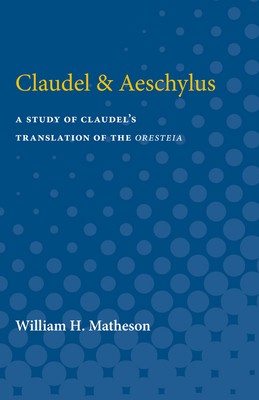
- We will send in 10–14 business days.
- Author: William Matheson
- Publisher: University of Michigan Press
- ISBN-10: 0472751638
- ISBN-13: 9780472751631
- Format: 15.2 x 22.9 x 1.4 cm, softcover
- Language: English
- SAVE -10% with code: EXTRA
Reviews
Description
This is the most important book to date on one of the giants of modern literature. It examines in detail a dramaturgy that continues to dominate the contemporary stage. In a brilliant confrontation of the question of translation, Matheson discusses the hows and the why that face the artist-as-translator. He shows the terms by which ancient myth is made theatrically significant to the playgoer of today. The author traces the spiritual and artistic development of Claudel, the self-willed, individualistic French artist who found in the works of the difficult, uncompromising Aeschylus prefigurations of his own life. Claudel's training in the classics, his early admiration of Mallarmé, the Aeschylean reminiscences in his early plays Partage de midi and Tête d'Or anticipate his own brilliant trilogy. But it was through his translation of the Oresteia, a translation that Matheson analyzes in detail, that this most important of French dramatists assimilated Aeschylus to recast him for the modern stage. Claudel and Aeschylus, through an examination of Claudel's crucial Aeschylean strain, shows the centrality and the significance of the Hellenic in the work of one of the most important literary figures of our age.
EXTRA 10 % discount with code: EXTRA
The promotion ends in 20d.19:05:59
The discount code is valid when purchasing from 10 €. Discounts do not stack.
- Author: William Matheson
- Publisher: University of Michigan Press
- ISBN-10: 0472751638
- ISBN-13: 9780472751631
- Format: 15.2 x 22.9 x 1.4 cm, softcover
- Language: English English
This is the most important book to date on one of the giants of modern literature. It examines in detail a dramaturgy that continues to dominate the contemporary stage. In a brilliant confrontation of the question of translation, Matheson discusses the hows and the why that face the artist-as-translator. He shows the terms by which ancient myth is made theatrically significant to the playgoer of today. The author traces the spiritual and artistic development of Claudel, the self-willed, individualistic French artist who found in the works of the difficult, uncompromising Aeschylus prefigurations of his own life. Claudel's training in the classics, his early admiration of Mallarmé, the Aeschylean reminiscences in his early plays Partage de midi and Tête d'Or anticipate his own brilliant trilogy. But it was through his translation of the Oresteia, a translation that Matheson analyzes in detail, that this most important of French dramatists assimilated Aeschylus to recast him for the modern stage. Claudel and Aeschylus, through an examination of Claudel's crucial Aeschylean strain, shows the centrality and the significance of the Hellenic in the work of one of the most important literary figures of our age.


Reviews